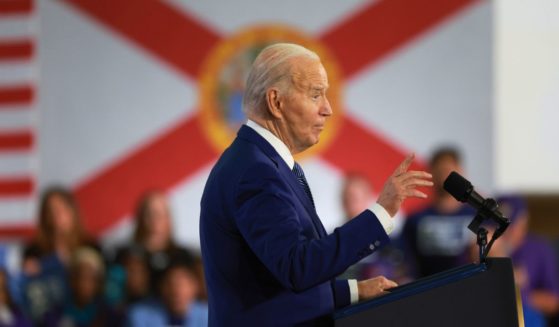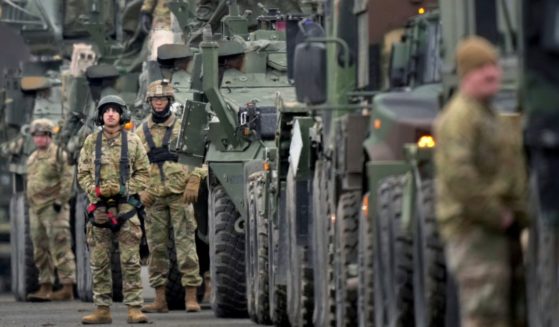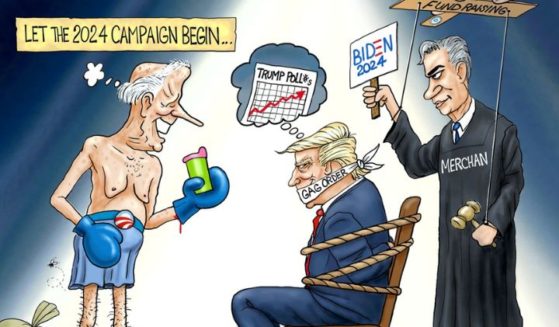Taliban Threaten Biden and Other Leaders with Something We All Know They Won't Be Able to Handle
The Taliban is running out of money. Afghanistan is standing on the edge of an economic abyss, and Western powers will have to respond.
Even though Afghanistan is running out of money, the country does have about $9 billion in offshore frozen assets, according to Reuters. Now the Taliban leadership is asking the U.S. and other European governments to unfreeze these assets that have been sitting in banks and the U.S. reserve.
Since the U.S. and other Western governments are not recognizing the Taliban as a legitimate Afghan government, what has given the Taliban the guts to ask for money?
The threat of what will happen if Afghanistan runs out of money is no joke, so now the Taliban is hoping to use that as leverage.
Afghanistan is already in pretty dire straits, but if there is complete economic collapse, the pressure on Western powers, particularly on Europe, would be immense. This would then impact the U.S. economy, which is already experiencing a supply chain crisis and labor shortages as the recovery from the COVID lockdowns continues.
Along with the economic impact, standing by while Afghanistan collapses would leave the U.S. and Europe responsible for one of the worst humanitarian crises of the century.
“If reserves remain frozen, Afghan importers will not be able to pay for their shipments, banks will start to collapse, food will be become scarce, grocery stores will be empty,” Shah Mehrabi, a board member of the Afghan Central Bank, told Reuters.
The decision about whether to unfreeze the assets will have to be quick. Afghanistan is just months away from quite literally running out of money.
“The situation is desperate, and the amount of cash is dwindling. There is enough right now … to keep Afghanistan going until the end of the year,” Mehrabi said.
The U.S. currently has about $8 billion of Afghanistan’s cash, according to Axios, but has told the Taliban that it will not release the money.
“The money belongs to the Afghan nation. Just give us our own money. Freezing this money is unethical and is against all international laws and values,” spokesman Ahmad Wali Haqmal told Reuters.
But it is on the ground of ethics that the U.S. is refusing to give the money. Not only does the U.S. refuse to recognize the Taliban’s rule as legitimate, but after seeing its oppressive rule in the 1990s, there is a natural hesitation to fund that type of tyranny.
“Releasing the reserves is no guarantee Taliban will actually use it effectively to solve problems,” one administration official told Axios. “The Taliban was in control in the ’90s and was not a responsible economic steward, and they have shown zero evidence they will be responsible stewards now.”
However, the U.S. was in face-to-face talks with Taliban officials in Doha earlier this month. American officials promised that they would sustain humanitarian aid to Afghanistan. But Taliban officials highlighted that they really needed the frozen assets.
“We clearly told [the Americans] that nobody benefits from an unstable Afghanistan, so no one should try to weaken the current government of Afghanistan or fuel problems for our Afghan people who already are struggling economically,” the Taliban acting Foreign Minister Amir Khan Muttaqi said, according to Voice of America.
It appears that the Taliban are trying to test particularly the Biden administration. After the horrifically planned American withdrawal left Afghanistan hobbled and fragile, perhaps Biden would be willing to do the Taliban a favor.
On top of the withdrawal chaos, the Taliban are also watching as Biden suggests paying recompense to migrant families separated at the border. Perhaps the Taliban can get some of that generosity as well since Biden helped wreck the country.
Furthermore, since the U.S. pulled out of Afghanistan, the rise of ISIS-K (the Islamic State in Afghanistan), is causing problems that could quickly threaten America unless the Taliban is able to squash ISIS.
After the Pentagon’s alarming announcement earlier in the week that the Islamic State will probably be able to launch attacks against the U.S. in the next six months, it is certainly in America’s best interest to enable the Taliban to fight ISIS. But a collapsing state and no money could hinder the Taliban in stopping ISIS.
“It’s not clear whether the Taliban will help control the terrorist threat. [Pentagon policy chief Colin] Kahl said the Taliban is ‘highly motivated’ to combat their ‘mortal enemy’ ISIS-K, but that it’s unclear if the new government of Afghanistan has the ability to actually fight the insurgent group,” Defense One reported.
So in the broader picture of protecting American interests, it actually would not be the worst idea to unfreeze some of Afghanistan’s assets.
Of course, there is no guarantee the Taliban will use the money well. There should even be an expectation that they will use it for their oppressive, tyrannical purposes. But if it wards off damaging economic collapse, it might be worth it.
Truth and Accuracy
We are committed to truth and accuracy in all of our journalism. Read our editorial standards.












